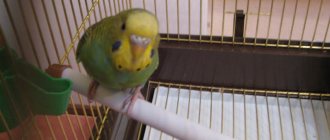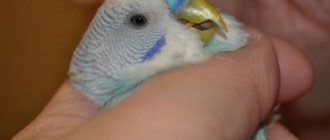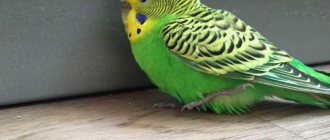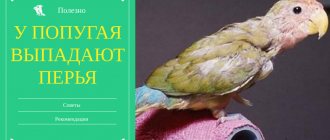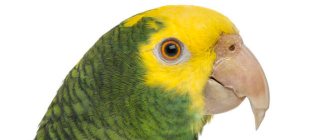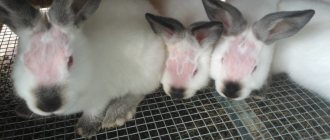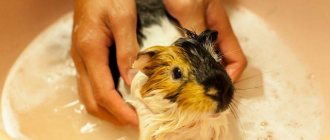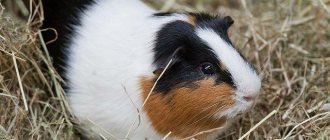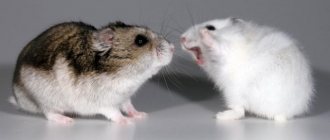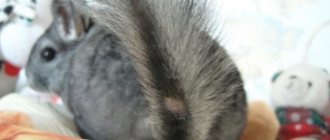Birds, unlike mammals, are much less likely to suffer from gastrointestinal problems. This is due to anatomical features: the excretory system of birds is united, all remnants of undigested food, liquid and solid, exit through the cloaca. However, constipation problems occur in budgies, which can cause serious harm to the pet and even cause its death.
Why does budgies get constipated?
The reasons for the occurrence of this disease are different. To cure, it is necessary to correctly establish why the poor bird cannot part with the digested food.
Stressful situations
You will be surprised, but constipation can occur after a housewarming party. Changing a place of residence is a lot of stress for a bird. A new place, a new environment, everything around is unclear and scary. This is the “nervous” form of the disease. The bird needs to be unobtrusively helped to get comfortable, without disturbing it again.
A stressful situation is one of the causes of constipation in a parrot
Fatty food
For those who like to eat tasty, fatty meat, the winged pets can steal a piece from the plate, or even right from the fork. The owner is touched, the pet is happy. But the liver protests. Fatty foods overstrain the liver and cause increased bile production. And fats constantly entering the body will lead to hepatic lipidosis.
Even excessive consumption of seeds and nuts can upset digestion and cause constipation in your budgie.
Lack of water
Normal feces are formed only with sufficient water. Excess grain in the diet can cause problems with bowel movements. After all, the grain must be softened by water so that the formed feces can leave the body unhindered and easily. You need to make sure that the bird always has fresh, clean water.
Constipation is caused by lack of water
Poor quality or stale food
Eating such a product can lead to both constipation and diarrhea, depending on your luck. Both ailments are unpleasant and can lead to complications. Therefore, feed your bird high-quality, fresh, not stale food.
Intestinal infections
Infectious diseases of the gastrointestinal tract provoke both constipation and diarrhea. Most often it is diarrhea. Usually antibiotics are used for treatment, but here the help of a doctor is necessary.
Helminth infection
Helminthiasis (or simply worms) can appear in a parrot, even if the bird has never been outside.
Where will the worms come from then?
Very simple. Worm eggs and bird droppings land on grain and grass and wait quietly. Such grain can end up in food, even those purchased at a pet store. This is where the larvae eaten by the parrot will begin to develop. Helminthiasis is guaranteed for your pet.
Where do worms come from in a parrot?
Self-infection is possible. This is when you performed anthelmintic treatment on the bird, but the cage was not disinfected. The remaining helminth eggs (you won’t see them, but they are there) will easily fall back onto the food, and re-infection will begin.
Poultry obesity
A good appetite in animals is an indirect sign of health. But if the pet eats a lot, loves to take part in the master's feasts, and never refuses a tasty piece, then the bird is at risk of obesity. As in humans, it is a general disease that affects the entire body. But, of course, first of all, the gastrointestinal tract suffers. He may simply not have time to process everything that the little glutton swallowed. Obesity is aggravated by the parrot's sedentary lifestyle.
Shards of stone or chalk
Every caring owner will have a stone, chalk, and sepia in their bird house for grinding down the beak. When a bird uses them, it can swallow pieces of it. They will cause constipation in the parrot.
Pieces of stone or chalk can cause constipation in a parrot
Treatment and care of birds
If your parrot has just become constipated and he doesn’t defecate very often, you can try to deal with the problem yourself. To do this you need:
- throw away old food;
- change the water;
- remove stone, chalk and sand from the cage;
- mix some flax seeds into the food, which act as a mild laxative;
- organize regular walks around the apartment for the bird.
If your pet has not defecated for 5 or 7 hours, you can give it 1 drop of flaxseed or pumpkin oil in its beak.
Symptoms of the disease
The frequency of bowel movements in your pet has decreased, and the stool has become hard - this is a cause for concern.
The disease is accompanied by a refusal to feed. The bird is trembling, lethargic. When attempting to defecate, the feathered individual shakes its tail, strains, and squeaks pitifully, like a tiny chick.
In severe cases, the parrot tries to help “break through the plug” with its beak, but instead only injures the cloaca and adjacent tissues and plucks out feathers. Pay attention to the color of the litter:
- gray or light yellow may indicate constipation;
- reddish or dark orange stool – a high probability of bacterial infection;
- dark gray or black stools – possible intestinal bleeding.
Prevention of diarrhea in budgies.
Causes
Diarrhea is an extremely common symptom that accompanies many health problems for feathered friends.
In addition to classic gastric diseases, indigestion can occur due to a wide range of different reasons.
In order to make a correct diagnosis and begin proper treatment, the owner must figure out what exactly his chick is suffering from. Before giving simple activated charcoal to a parrot, the owner should conduct a small medical study, or seek the help of an ornithologist.
Eating problems
Almost every case of diarrhea in a pet parrot is associated with poor diet. Organizing a quality diet is the most important stage in caring for your pet. A bird may experience an upset stomach after eating excessively juicy or green food the day before. This phenomenon is called polyuria, and is isolated in nature.
If the animal's stool does not return to normal after a long time: it acquires a liquid consistency, changes color and becomes extremely frequent, we can conclude that there is poisoning.
Poor quality drinking
Each parrot needs a large amount of boiled water, since such liquid is extremely poor in all kinds of useful additives and minerals. The lack of microelements is compensated by drinking plenty and regularly.
In this case, the chick begins to suffer from diarrhea after drinking liquid that has stood in the drinking bowl for 2-3 days. During this time, the water becomes more harmful due to the proliferation of pathogenic bacteria.
An excessive number of deteriorations acquired by a parrot affects the condition of its esophagus.
Calcium deficiency
Calcium deficiency (hypocalcemia) is a disease associated with a lack of the corresponding mineral in the pet’s body. The symptoms that occur with this disease include diarrhea. Other symptoms include problems with egg laying, muscle innervation, growth retardation, etc.
Drafts
The budgerigar is an extremely fragile pet that needs especially careful care and close attention. The cage with the feathered comrade should be located in a room in which there are no random drafts or cold gusts of air. A random breeze can easily catch an exotic bird with a cold, as a result of which it will develop a whole list of various symptoms, including an esophageal disorder.
Stress
Experienced owners of pet parrots know about one important character trait of these pets - we are talking about their vulnerability. Stress caused by a recent injury, fright, moving or mechanical damage can have a huge negative impact on the health of your feathered friend.
Symptoms of a psychological illness caused by a deterioration in the functioning of the nervous system include profuse diarrhea, expressed in the form of frequent, loose and watery stools.
What to do if your budgie is constipated?
Of course, if possible, you need to show the bird to a specialist - an ornithologist or a veterinarian. It is necessary to determine what causes the disease. Helminthiasis, for example, is diagnosed only by analysis.
What can help and won't hurt in any case?
Be sure to clean and disinfect the cage and all items in it.
Review your pet's diet
Parrot food must contain flaxseed; look at the packaging for ingredients. Eliminate grain, give steamed porridge (cook without salt and sugar), more vegetables, herbs and fruits.
Give your bird the opportunity to fly more often - physical activity is good for health in general, and for constipation in particular. Temporarily remove the sepia, chalk, and stone from the cage.
